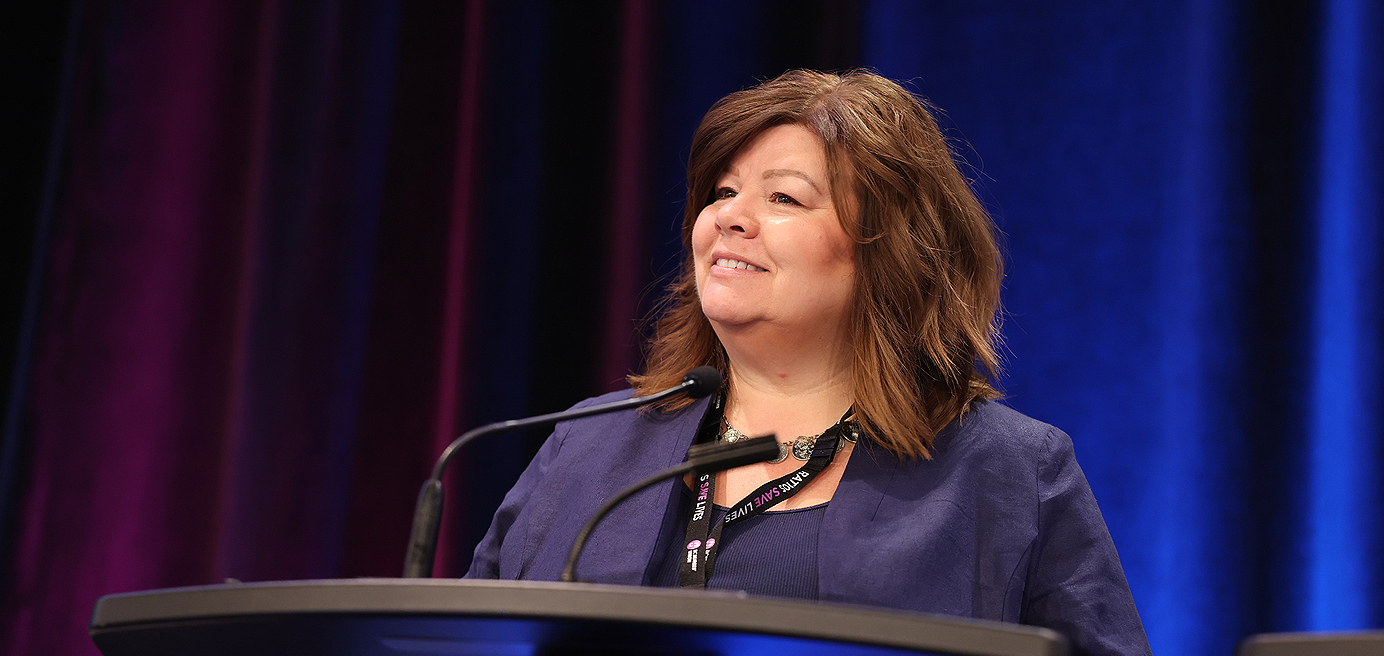 President’s Report: “We are Bold, we are Committed, and we are United”
President’s Report: “We are Bold, we are Committed, and we are United”

BCNU President Adriane Gear opened her convention report by acknowledging the traditional, unceded territory of the W̱SÁNEĆ people – Tsartlip and Tsawout First Nation – where she lives and works and thanked Elder Martin from the Musqueam Nation for welcoming BCNU to unceded territories in downtown Vancouver.
Reflecting on her second year as president, Gear outlined the wide-ranging priorities at the heart of her work as BCNU’s leader. These include implementing minimum nurse-to-patient ratios, preparing for Nurses’ Bargaining Association contract negotiations, strengthening member engagement, chairing the union’s Provincial Executive Committee and Council, and representing BCNU on the Canadian Federation of Nurses Unions (CFNU) National Executive Board.
She reiterated BCNU’s unshakeable commitment to fully implement ratios and negotiate a strong collective agreement that protects nurses’ benefits, respects their professional contributions to the health-care system and ultimately addresses the chronic understaffing, unsafe workloads, and workplace violence too many nurses still face. Gear pointed to WorkSafeBC data that paints a stark picture of a worsening crisis. Time-loss claims related to workplace violence among nurses across the profession have nearly doubled—rising from an average of 25 per month in 2014 to 46 per month in 2023.
She said the troubling statistics nevertheless provide her with purpose.
“Representing more than 50,000 licensed practical nurses, registered nurses, and registered psychiatric nurses is a tremendous responsibility, and at times, it can feel daunting,” she said. “But every day, I am inspired by the nurses of British Columbia. You are the reason I remain steadfast in my commitment to improving working conditions across our profession.”
Gear also showcased the organization’s significant governance enhancements, including BCNU’s new Diversity, Equity and Inclusion working group and training and education initiatives aimed at dismantling anti-Indigenous racism in health care. She emphasized five strategic priorities that guide the union’s work: member access to information, strengthening BCNU, effective governance, professionalism and practice, and enforcing member rights. She said each of these priorities reinforce the union’s commitments to truth and reconciliation, cultural safety, diversity, equity, inclusion and ethical governance.
Gear also showcased BCNU’s work to cultivate partnerships and alliances, including the union’s active role on CFNU’s National Executive Board and in the Canadian Health Coalition. She also thanked members who’ve stood in solidarity with other unions throughout the year, including BCGEU’s members at LifeLabs and Canadian Postal Workers who took job action in the last year.
Gear remarked on the recent decision to welcome BCNU back into the Canadian Labour Congress, the country’s largest labour organization, and the international recognition the union is receiving for its groundbreaking work to implement minimum nurse-to-patient ratios.
She noted that BCNU will attend the International Council of Nurses Congress in Helsinki this June, where global nursing leaders will hear how ratios improve care quality, enhance nurse retention, and generate long-term health-care system savings.
“The world is watching BC,” said Gear. “BCNU is helping bring decision-makers and the public along to understand why ratios are not just good policy—they are essential for the future of health care.”
She concluded with a passionate call to action, asking delegates to stay focused and reminding them that their collective strength and advocacy will help implement ratios, secure a fair contract and ensure all BCNU members can work in a safe environment.
“We are the nurses of BC. We are fifty thousand strong, and we are bold, we are committed, and we are united.”

